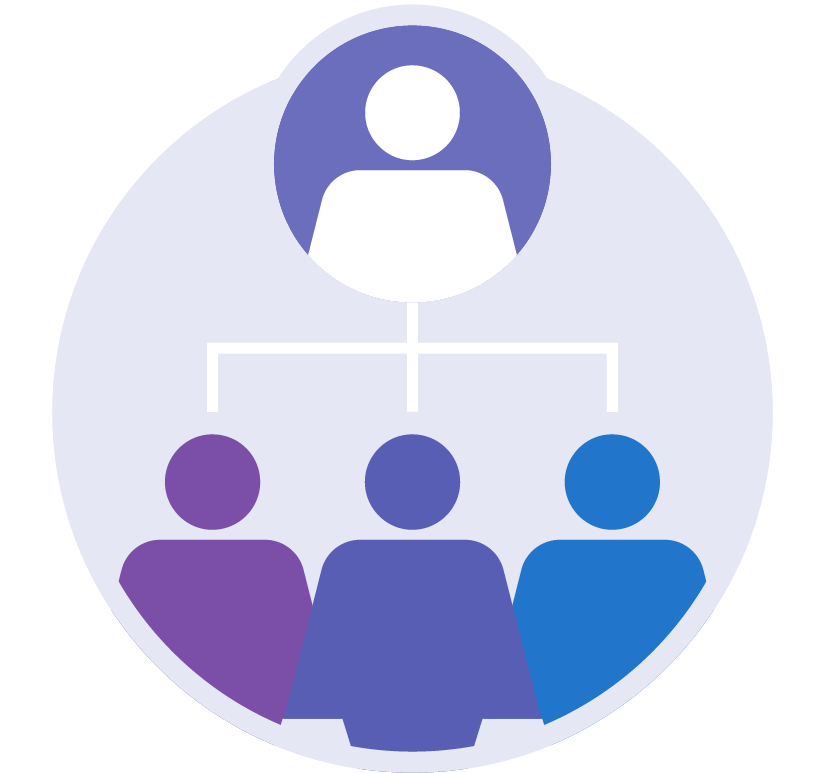A successful DEI strategy is one that’s embedded into the heart of a company’s business plan. DEI is too often an afterthought or a tick-the-box compliance model, rather than integrated into business strategy. DEI too often depends on individual champions, rather than being an ingrained habit for everyone in an organization. CEOs must drive an ongoing DEI conversation within tech and business organizations. Those tech and business organizations must then drive DEI outcomes across the enterprise. And all these leadership efforts must be directly inserted into a company’s accountability infrastructure and business plan.the start, but you do need to model a growth mindset for other leaders and hold yourself accountable for outcomes.
Establish DEI as a business imperative
HIGH LEVERAGE POINTS
CHANGE AGENTS






IN SUMMARY
2.1
Include DEI as a core company value and/or annual priority. Ensure each C-suite leader’s business plan has DEI objectives on representation, culture, and, where applicable, product.
2.2
Elevate the role of Chief Diversity Officer (CDO) to ensure they have adequate authority, training, and resources to influence C-suite.
2.3
Apply the same risk tolerance to DEI as to product innovation.
2.4
Devote part of one board meeting and, ideally, part of one quarterly earnings call to DEI challenges and progress.
2.5
Prioritize DEI in your company’s spending strategy through intentional partner, vendor, and supplier diversity policies.
MORE INFO
CISCO’S SOCIAL JUSTICE BELIEFS—VALUES IN ACTION
In the summer of 2020, the national and global reckoning with racial injustice helped accelerate Cisco’s long journey to dismantle injustice and inequity. The company established a set of Social Justice Beliefs and launched 12 subsequent actions with a five-year commitment to invest in social justice work focused on the Black and African American community.
The first step was to identify Cisco’s Social Justice Beliefs, which inspires how Cisco acts as a business, including their commitment to social justice, and supports the company’s core purpose, which is to power an inclusive future for all. Cisco engaged employees across the company to identify five beliefs: Technology for Good, Commitment to Justice, Addressing Insecurity of Being, Culture of Coalescence, and Curiosity, Proximity & Empathy.1 These beliefs are a constant. They provide a way to decide when and how the company takes action to respond to injustice across the full spectrum of diversity, now and into the future to drive generational change.
To ensure that Cisco has a big enough infrastructure to execute on its actions, the company created the Inclusive Future Action Office, which houses social justice strategic initiatives. This office currently supports the global enterprise-wide teams that are working on the 12 actions dedicated to the Black and African American community, helping to identify core objectives, define KPIs and measure progress and outcomes. For example, the Action Office is helping with the Action #8 team to execute on Cisco’s commitment to partner with Historically Black Colleges and Universities (HBCUs). In partnership with the Student Freedom Initiative and Computex Technology Solutions, Cisco made a $150 million commitment toward spurring the recovery, resiliency, and legacy of HBCUs in perpetuity.
To ensure success, the Action Office sets up clear time milestones for progress. The office also focuses on developing actions with recurring global impact, that can be replicated based on best practices. Each social justice action has an executive leadership team sponsor who is held accountable for progress in their performance. Over time, the company hopes to scale the office’s capabilities to take on any social justice issue or purpose-driven initiative Cisco wants to champion, from ideation to execution to measuring impact.
Footnotes:Cisco accelerated its journey to dismantle injustice and inequity by developing a framework to embed its social justice values into its company culture.
READ MORE
INCLUSIVE PROCUREMENT PROGRAM AT SALESFORCE
In 2020, Salesforce doubled down on its efforts to advance equity by forming the Racial Equality and Justice Task Force to drive systemic change in the workplace and community across four core pillars: people, purchasing, philanthropy, and policy. For purchasing, Salesforce’s goal is to commit $100 million to Black-owned businesses and $100 million to underrepresented minority (URM)-founded companies by 2023.
To help deliver on the strategy, the Task Force launched the first cohort of its Black-Owned Business Mentor/Sponsor Program in July 2021, supporting 25 Black-owned businesses with mentorship, sponsorship, education, and other corporate network opportunities to strengthen and grow their businesses.
The program pairs each participant with a senior Salesforce mentor to provide ongoing coaching and support in identifying and meeting their business goals. In addition, participants are matched with a Salesforce executive sponsor at the VP+ level who provides higher-level strategic guidance. These pairings are thoughtfully considered, taking into account the executive’s expertise and the participant’s unique needs. Every quarter, the program also offers 90-minute educational sessions with professors from top universities, who cover subjects like how to access capital and when to make strategic pivots. Participants also meet in group sessions to learn from other corporate supplier diversity leaders, discuss challenges, and share best practices.
The goal of the program is to build a strong pipeline of Black-owned businesses and suppliers. While this program won’t directly affect Salesforce’s internal supplier diversity goals, it is a critical part of its strategy to help close the racial wealth gap and advance equality.
Salesforce has also implemented several other initiatives to support its diverse procurement program, including introducing an accelerated payment option for small businesses and offering suppliers the option to shorten payment terms to net 15. Salesforce plans to expand the mentorship program with a second cohort of 25 Black-owned businesses next year.
Think big and get creative with your supplier diversity programs. Salesforce doubled down on its commitment to supplier diversity, launching the first cohort of its Black-Owned Business Mentor/Sponsor Program, introducing an accelerated payment option for small businesses and setting ambitious spending goals for Black-owned businesses and URM-founded companies.
READ MORE
